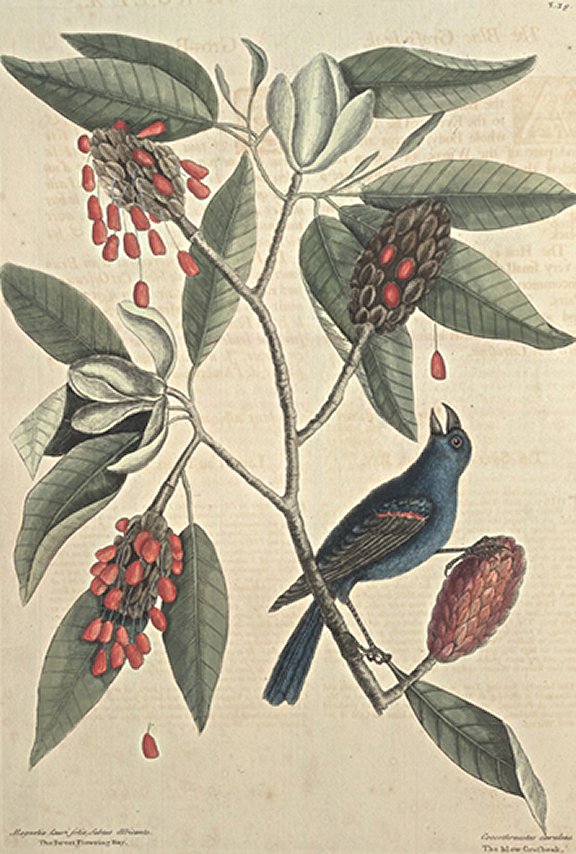Plate Number: I 39Coccothraustes Caerulea: The Blue Gross-beak A Narrow black Lift encompasses the Basis of the Bill, and joins to the Eyes: The Head and whole Body, except the Tail and part of the Wings, of a deep blue. Below the shoulder of the Wing are a few red Feathers: The lower part of the Wing and Tail brown, with a mixture of green; The Legs and Feet of a dusky black. The Hen is all over dark brown, with a very small mixture of blue. It is a very uncommon and solitary bird, seen only in Pairs. They have one single Note only, and appear not in Winter. I have not seen any of these Birds in any parts of America but Carolina. Magnolia Lauri folio, subtus albicante: The Sweet Sweet Flowering BayThis is a small Tree, usually growing sixteen Foot high; the Wood white and spongy, covered with a white Bark. The Leaves are in shape like those of the common Bay, but of a pale green, having their back-sides white: In May they begin to blossom, continuing most part of the Summer to perfume the Woods with their fragrant flowers, which are white, made up of six Petala, having a rough conic Stylus, or rudiment of the Fruit: which, when the Petala fall, increases to the bigness and shape of a large Walnut, thick set with knobs or risings; from every of which, when the Fruit is ripe, is discharged flat Seeds of the bigness of French Beans, having a kernel within a thin Shell, covered with a red Skin. These red Seeds, when discharged from their cells, fall not to the ground, but are supported by small white threads of about two Inches long. The Fruit at first is green; when ripe, red; and when declining, it turns brown: They grow naturally in moist places, and often in shallow Water; and what is extraordinary, they being removed on high dry ground, become more regular and handsomer Trees, and are more prolific of flowers and fruit: They usually lose their leaves in Winter, except it be moderate. This beautiful flowring Tree is a Native both of Virginia and Carolina, and is growing at Mr. Fairchild's in Hoxton, and at Mr. Collinson's at Peckham, where it has for some years past produced its fragrant Blossoms, requiring no protection from the Cold of our severest Winters. |